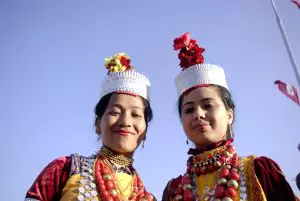 Largely, we live in a patriarchal world: men make most of the big decisions in government, in the office, and the household. Whether this is to our detriment or benefit, or neither, is up for discussion. Since matriarchal societies are present as well, it is intriguing to delve into their ways of governance and how their cultures operate. Prominent matriarchal societies are the Mosuo, the Minangkabau, the Akan, the Bribri, the Garo, and the Nagovisi. In the following paragraphs, information about these societies will be disclosed in detail.
Largely, we live in a patriarchal world: men make most of the big decisions in government, in the office, and the household. Whether this is to our detriment or benefit, or neither, is up for discussion. Since matriarchal societies are present as well, it is intriguing to delve into their ways of governance and how their cultures operate. Prominent matriarchal societies are the Mosuo, the Minangkabau, the Akan, the Bribri, the Garo, and the Nagovisi. In the following paragraphs, information about these societies will be disclosed in detail.

✅ AI Essay Writer ✅ AI Detector ✅ Plagchecker ✅ Paraphraser
✅ Summarizer ✅ Citation Generator
Beginning with the Mosuo, they live in China near the Tibetan border. According to Mental Floss, “The Mosuo live with extended family in large households; at the head of each is a matriarch. Lineage is traced through the female side of the family, and property is passed down along the same matriline. Mosuo women typically handle business decisions and men handle politics” (“6 Modern Societies Where Women Rule”). In addition, children are raised in the mother’s household and take the mother’s name. Sometimes the father has only a small role in parenting.
From China we travel to Indonesia, where the Minangkabau reside as the largest matriarchal society. As Wordlette says, “The traditional Minangkabau long houses, called rumah gadang, are owned by the women of the family who live there, passing from mother to daughter. Husbands are only tolerated in the house under certain conditions, and return to their sister’s house to sleep. When men return from their rantau travels, they are expected to contribute financially to the construction and maintenance of the house” (Hand, Rachel). Moreover, women are seen as the head of the family, and their most important traditions are women-centered.
Cruising over to Africa, we have the Akan people that live mostly in Ghana. According to Mental Floss, “The Akan social organization is fundamentally built around the matriclan, wherein one’s identity, inheritance, wealth, and politics are all determined. All matriclan founders are female, but men traditionally hold leadership positions within the society. These inherited roles, however, are passed down matrilineally—meaning through a man’s mothers and sisters (and their children)” (“6 Modern Societies Where Women Rule”). In their society, men make sure their wives and family are supported, as well their female relatives.
Going out of Africa and into South America, we have the Bribri people of Costa Rica. Based on research by Intercontinental Cry, “The Bribri’s matriarchal clan structure means that tribal lineage is passed down through the mother, and knowledge and tradition is passed down by the grandmother” (Parker, Courtney). In addition, the tribe believes that “Mother Earth” is sacred and that one should live in alignment with it. “No one model can perhaps ever speak for all women but the Bribri experience seems to truly embody and express the key concepts and constructs aligned with the more holistic, rising model of ecofeminism” (Parker, Courtney). It seems that the ancient world is informing contemporary feminists about how to be better in their lifestyle choices.
Another exemplary example of a matriarchal society comes in the form of the Garo from India. According to Mental Floss, “…the Tibeto-Burman-speaking Garos pass property and political succession from mother to daughter—typically, he youngest daughter inherits her mother’s property. Once married, [a] husband lives in his wife’s house. Should it not work out, the union is dissolved without social stigma, as marriage is not a binding contract” (“6 Modern Societies Where Women Rule”). So, not only do Garo women control property, but also marriages.
Living on the island of South Bougainville close to New Guinea and Australia, the Nagovisi have women at the heart of their agriculture and leadership. Nagovisi women partake in the majority of the farming, and men depend on them to give food to the community. The men of the community only help with heavy-duty tasks. In accordance with this, women have the right to transfer land and goods to their daughters. Usually, a man in this society goes to live with the wife, and marriage itself is not institutionalized. In terms of leadership, women often take the spotlight, as they commonly have more responsibilities than the men (“Matriarchies”).
Though these six examples of matriarchal cultures are impressive, there are many more representatives of women ruling certain societies. The main point to comprehend from these examples is that this type of governance is not harmful, and has been sustained and fruitful for countless generations.
Works Cited
“6 Modern Societies Where Women Rule.” Mental Floss, 4 Mar. 2017, mentalfloss.com/article/31274/6-modern-societies-where-women-literally-rule.
Hand, Rachel. “The Minangkabau: A Matriarchal Society.” Wordlette, http://www.worldette.com/make-a-difference/care/2012/minangkabau-matriarchal-society/.
Parker, Courtney. “Bribri, Un Matriarcado Moderno: Costa Rica’s Living Matriarchy.” Intercontinental Cry, IC, 4 Aug. 2018, intercontinentalcry.org/bribri-un-matriarcado-moderno-costa-ricas-living-matriarchy/.
“Matriarchies.” MMS Scholars, mmstudies.com/matriarchies/nagovisi/.
Follow us on Reddit for more insights and updates.





Comments (0)
Welcome to A*Help comments!
We’re all about debate and discussion at A*Help.
We value the diverse opinions of users, so you may find points of view that you don’t agree with. And that’s cool. However, there are certain things we’re not OK with: attempts to manipulate our data in any way, for example, or the posting of discriminative, offensive, hateful, or disparaging material.